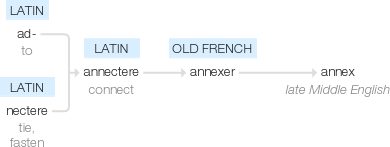Annex
late Middle English: from Old French annexer, from Latin annectere ‘connect’, from ad- ‘to’ + nectere ‘tie, fasten’.
wiktionary
Borrowed from French annexe, from Latin annexus.
From Middle English annexen, anexen, from Old French annexer(“to join”), from Medieval Latin annexāre, infinitive of annexō, frequentative of Latin annectō(“bind to”), from ad(“to”) + nectō(“tie, bind”).
etymonline
annex (v.)
late 14c., "to connect with," from Old French annexer "to join, attach" (13c.), from Medieval Latin annexare, frequentative of Latin annecetere "to bind to," from ad "to" (see ad-) + nectere "to tie, bind" (from PIE root *ned- "to bind, tie"). Usually meaning "to join in a subordinate capacity," but that notion is not in the etymology. Of nations or territories, c. 1400. Related: Annexed; annexing.
annex (n.)
1540s, "an adjunct, accessory," from French annexe "that which is joined" (13c.), from annexer "to join" (see annex (v.)). Meaning "supplementary building" is from 1861.
